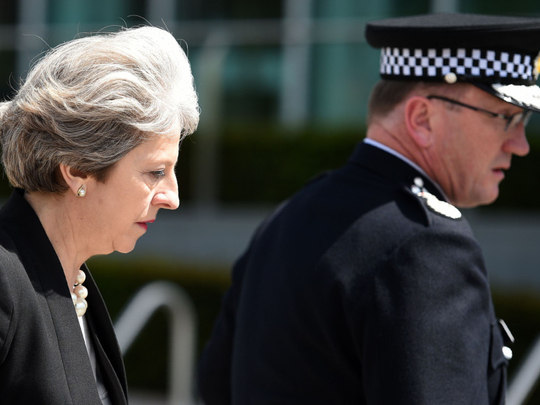
We are days away from the British parliamentary elections on Thursday. I’m not going to predict the result, but it’s already clear that the British prime minister will not get the landslide she wanted. The same polls that showed a huge majority for Theresa May two months ago have narrowed. Some foresee, if not an outright Labour victory, then at least a hung Parliament. Even if she wins, her position is tarnished. Support that seemed solid has vanished. Why?
For one, it looks like her watered-down English national populism doesn’t work — or at least can’t compete with the tougher, nastier, harder-core version of populism on the British left. As I wrote when it started, this election has been a contest between parties that are offering extremist versions of what they used to be. May has run a campaign that has sought to put some distance between herself and her “elite” party.
‘Mayism’ was launched with posters calling on voters to support ‘May’s Team’ instead of the Conservative Party; other tactics included frequent repetition of the phrases “strong and stable,” “ordinary people” and — to describe her opponents — “coalition of chaos.”
But she also announced policies and then retreated from them, refused to appear at televised debates, declared this a “Brexit election” and then refused to talk about Brexit. Her cabinet includes several people who played major roles in the Brexit campaign and famously promised gains from leaving the European Union that they knew would never be achieved. “Strong and stable”? The No 2 pop song in the country, with 2 million YouTube views as of Saturday, is Liar Liar, an anti-May tune that has caught on precisely because her attempt to make the Conservative Party seem less conservative doesn’t convince everyone. The lyrics are extremely blunt (“she’s a liar, liar”) and they echo the language of the Labour Party, whose quasi-Marxist rhetoric describes a wrecked country in need of revolutionary change: “Nurses going hungry, schools in decline. I don’t recognise this broken country of mine.”
Labour’s advantage
Instead of helping May, the nihilistic “we don’t believe in any-thing, we don’t trust anybody” mood that helped the “leave” campaign win the Brexit vote is now working in the Labour Party’s favour. The Labour leader, Jeremy Corbyn, is an old-fashioned leftist who doesn’t do slick campaigning — and that seems to appeal to people right now. He hasn’t changed his views about anything since the 1970s — he would nationalise industry if he could, he has never been too keen on Nato, nuclear defence or the British army — and somehow that makes him seem sincere. Labour’s slogan, “For the many, not the few,” sounds like a Labour Party slogan, not something chosen by a public relations team.
In the end, it may also be that the European referendum last June destabilised the British political scene even more than we thought possible. Suddenly a huge host of questions has been opened up, from the future of Northern Ireland to the future of London’s financial services industry. For nearly a year, nobody in public life has really attempted to answer any of them.
May campaigned to stay in Europe, then announced a tough-sounding plan to leave Europe; at no time has she offered any details, or even a sense of what the choices might be. The economic impact of Brexit hasn’t yet registered — Britain hasn’t left the EU and won’t do so for nearly two years — but there is plenty of nervous activity, as companies and people argue about whether to stay or leave.
Sooner or later the British were bound to ask who created all of this uncertainty, and sooner or later the blame was bound to fall on the Conservative Party, whose leaders launched the referendum and who have run the country since it happened. Perhaps that moment has simply arrived earlier than anticipated.
— Washington Post
Anne Applebaum is the director of the Global Transitions Programme at the Legatum Institute in London.









